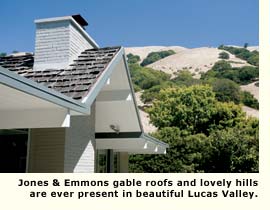The Eichlers of Lucas Valley - San Rafael
 Like any pioneer community, Lucas Valley had to learn to do for itself. It learned quickly, and it's never forgotten.
Like any pioneer community, Lucas Valley had to learn to do for itself. It learned quickly, and it's never forgotten.
Today, the neighborhood possesses a serenity and a sense of being truly special, brought on by its setting—a broad valley surrounded by steep, oak-forested hillsides—and by its well-preserved, almost pristine modern architecture, low-slung houses comfortably arrayed along lazy, curving streets.
It's easy today to survey Lucas Valley and think, "Yes, it was destined to be this way." But it took more than a wonderful setting to ensure that the neighborhood would become and remain such a treasure.
Residents organized shortly after moving into the 538-home neighborhood, which was built in the mid-1960s next to a dairy farm by Joe Eichler, to ensure that they would receive adequate fire protection. They continued to organize during the next decades to protect their hillsides, battling off developers and city, county, and state officials who dreamed of bringing to the valley new roads and homes.
"We've been fighting these battles for a long time," says Ron Marinoff, who's lived in Lucas Valley for 43 years, raising two boys with his wife Peggy. Marinoff, who lives in a flat-roofed Eichler, helped form the ZAP (Zoning and Planning) Committee, was president of the Lucas Valley Homeowners Association, and served and still serves on many committees, including the Marinwood Fire Commission. And through its still-active architectural review committee Lucas Valley has done a remarkable job of preserving its architectural character.

"It's the people who have made the neighborhood what it is," says Patrick Hunter, a young architect who serves as president of the Lucas valley Homeowners Association, referring to the early residents. "They passed down a lot about what they feel is important about this area to the next generations."
The neighborhood was forced to organize early in its existence, but its pioneer aura remains—and not just because it's one of the few Eichler neighborhoods anywhere to have its own stables and possess a contingent of horse riders. Residents still watch out for each other, and for the good of their community, Hunter says.
Eichler gave residents much to work with. In one of his most-admired decisions, he ensured that views of the hills would be unimpeded. All utility lines are buried. But the unincorporated neighborhood, near San Rafael, lacked adequate fire protection. And there was no guarantee that the natural hillsides would remain undeveloped.

The neighborhood was forced to organize early in its existence, but its pioneer aura remains—and not just because it's one of the few Eichler neighborhoods anywhere to have its own stables and possess a contingent of horse riders. Residents still watch out for each other, and for the good of their community, says Patrick Hunter, a young architect who serves as the association's president.
"It's the people who have made the neighborhood what it is," he says, referring to the early residents. "They passed down a lot about what they feel is important about this area to the next generations." The results are immediately evident to the visitor. Crossing Miller Creek, on one of the unusual, Asian-flavored bridges with upturned railings, is like leaving the real world behind. Idylberry Road, which winds through the subdivision, might as well be paved of yellow brick.
"The first time you see it, you pull off Lucas Valley Road, and there's something very appealing about it," says Hunter, who moved here seven years ago. "You come across those bridges, the low design of the houses, the low rooflines—they really seem to be part of the natural landscape."
Commonly called 'Upper Lucas Valley,' the Lucas Valley subdivision is clearly defined by its physical boundaries—the creek to the south, the hills to the north. To the east is another Eichler development, Marinwood, which was built in the late 1950s and known today as 'Lower Lucas Valley.' To the north is a small, newer subdivision of stucco ranch-style houses.
"You feel a sense of enclosure," says Catherine Munson, who helped run the original sales office for Eichler, and today runs Lucas Valley Properties. "It gives an intimacy that I think contributes to the quality of life out here, maybe subliminally."




